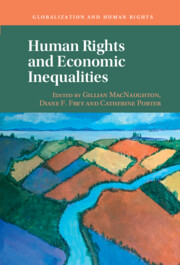Book contents
- Human Rights and Economic Inequalities
- Reviews
- Globalization and Human Rights
- Human Rights and Economic Inequalities
- Copyright page
- Dedication
- Contents
- Figures
- Tables
- Boxes
- Notes on Contributors
- Acknowledgments
- 1 Introduction
- Part I Conceptualizing and Measuring Human Rights and Economic Inequalities
- Part II Causes and Consequences of Economic Inequalities
- Part III Socioeconomic Rights and Economic Inequalities
- 10 Distributive Justice, and Economic and Social Rights
- 11 Fair Wages and a Decent Living: Paths to Greater Vertical Equality
- 12 Economic Inequality and the Right to Social Security: Contested Meanings and Potential Roles
- 13 Education, Income Inequality and the Right to Participate in Cultural Life
- 14 Implications of the Health Equity Perspective for the Right to Health
- 15 The Potential Impact of the Right to Housing to Address Vertical Inequalities
- Index
- References
13 - Education, Income Inequality and the Right to Participate in Cultural Life
from Part III - Socioeconomic Rights and Economic Inequalities
Published online by Cambridge University Press: 29 September 2021
- Human Rights and Economic Inequalities
- Reviews
- Globalization and Human Rights
- Human Rights and Economic Inequalities
- Copyright page
- Dedication
- Contents
- Figures
- Tables
- Boxes
- Notes on Contributors
- Acknowledgments
- 1 Introduction
- Part I Conceptualizing and Measuring Human Rights and Economic Inequalities
- Part II Causes and Consequences of Economic Inequalities
- Part III Socioeconomic Rights and Economic Inequalities
- 10 Distributive Justice, and Economic and Social Rights
- 11 Fair Wages and a Decent Living: Paths to Greater Vertical Equality
- 12 Economic Inequality and the Right to Social Security: Contested Meanings and Potential Roles
- 13 Education, Income Inequality and the Right to Participate in Cultural Life
- 14 Implications of the Health Equity Perspective for the Right to Health
- 15 The Potential Impact of the Right to Housing to Address Vertical Inequalities
- Index
- References
Summary
Anton Chekhov said that art “prepares us for tenderness” (Saunders 2004). Taking the idea a step further, Martha Nussbaum maintains that the arts and humanities teach what it is, “to be a human being capable of love and imagination” (Nussbaum 2002, 301). Both suggest arts and humanities open us up to what it means to be citizens in an open, democratic society. In that sense, access to an education that meaningfully includes the arts and humanities is instrumental to the fulfillment of Article 27 of the Universal Declaration of Human Rights (UDHR), which asserts that “[e]veryone has the right freely to participate in the cultural life of the community.” But to what extent does that access – and the guarantee of unfettered participation – depend on wealth? This chapter argues that the right to participation laid out in Article 27 infers a positive obligation to provide opportunities to investigate what it means to be human and that education plays a vital role in doing so. Furthermore, it argues that the current educational focus on the marketplace and employability has a crowding-out effect on the exposure to the civic tools that the arts and humanities provide. While not a human rights violation per se, the current focus on education-as-job-training constitutes a barrier to the free participation in cultural life that disproportionally affects the cultural citizenship of low-income people.
- Type
- Chapter
- Information
- Human Rights and Economic Inequalities , pp. 316 - 336Publisher: Cambridge University PressPrint publication year: 2021

